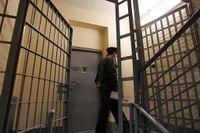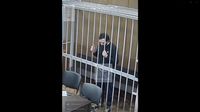In a significant legal development, Yuri Bozoian, the general director and co-founder of the St. Petersburg IT company Aeza Group, has been arrested on serious charges including organizing a criminal community and drug trafficking. This news was confirmed by the press service of the Meshchansky Court in Moscow on April 4, 2025.
According to the court's decision, Bozoian, whose full name is Yuri Meruzhanovich Bozoian, was detained for two months after the court granted a petition from the investigator. He is accused of involvement in illegal activities as outlined under part 33, paragraphs 'a' and 'g' of part 4 of Article 228.1 of the Criminal Code of the Russian Federation, which pertains to the illegal production, sale, or transfer of narcotic drugs by an organized group on a particularly large scale.
Bozoian's arrest follows a series of events that began with police searches at the Aeza Group office on April 1, 2025. During these searches, authorities examined the company's operations, which are reportedly linked to criminal activities, including money laundering and the organization of a criminal community. The office is located in the former Wagner Center on Zolotaya Street in St. Petersburg.
In addition to Bozoian, two other individuals, Maxima Orla and Tatyana Zubova, have also been charged in connection with the same case. They are accused of participating in the criminal community and attempting to engage in illegal drug trafficking. The court has ordered their detention for one month and seventeen days.
Reports indicate that the Aeza Group has been under scrutiny for its alleged role in facilitating illegal activities, including providing servers for an online store that sells banned substances in Russia. The company is also accused of protecting this operation from DDoS attacks, further complicating its legal standing.
According to investigators, the Aeza Group is believed to be a key player in the Russian disinformation network known as Doppelgänger. This network has been accused of disseminating false information across Europe since May 2022, promoting Kremlin interests and undermining unity among adversaries like the United States and Western Europe. Investigators suggest that Aeza Group provides the technical infrastructure necessary for these operations, allowing cybercriminals to operate on its servers, primarily targeting clients in the dark web.
While the connection between Bozoian and the Doppelgänger network has not been definitively established, the investigation highlights the potential overlap between legitimate business operations and criminal activities. The Aeza Group, established in June 2021, offers a range of services including data processing and server rental, with reported revenues of 66.9 million rubles in 2024.
As the investigation unfolds, the implications for Bozoian and his associates are severe. Under the Russian Criminal Code, the charges against them carry significant prison sentences, with potential penalties reaching up to 20 years for serious violations related to drug trafficking and organized crime.
The situation has raised questions about the intersection of technology, legality, and ethics in the rapidly evolving digital landscape. As law enforcement agencies continue to crack down on organized crime, the case against Bozoian and the Aeza Group serves as a stark reminder of the challenges faced in regulating online activities and maintaining public safety.
In the wake of these events, the Aeza Group maintains that it operates within the legal framework, but the ongoing investigation could significantly impact its reputation and future operations. The company's website remains functional, and it continues to offer its services, despite the serious allegations against its leadership.
This case underscores the broader issues of criminal activity in the tech sector, particularly as it relates to cybersecurity and the illicit use of digital platforms for illegal trade. As authorities work to dismantle criminal networks, the role of companies like Aeza Group will be scrutinized more closely, highlighting the need for robust regulatory frameworks to prevent such abuses.
As the legal proceedings continue, the outcomes for Bozoian, Orla, Zubova, and the Aeza Group will be closely watched, not just for their individual fates but for the implications they hold for the tech industry in Russia and beyond.






